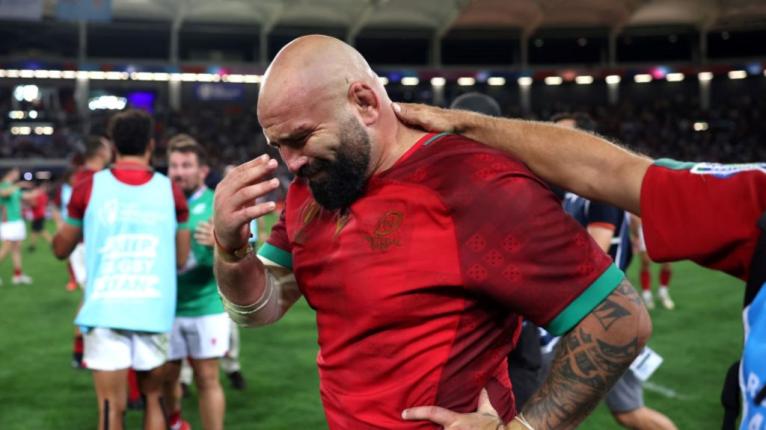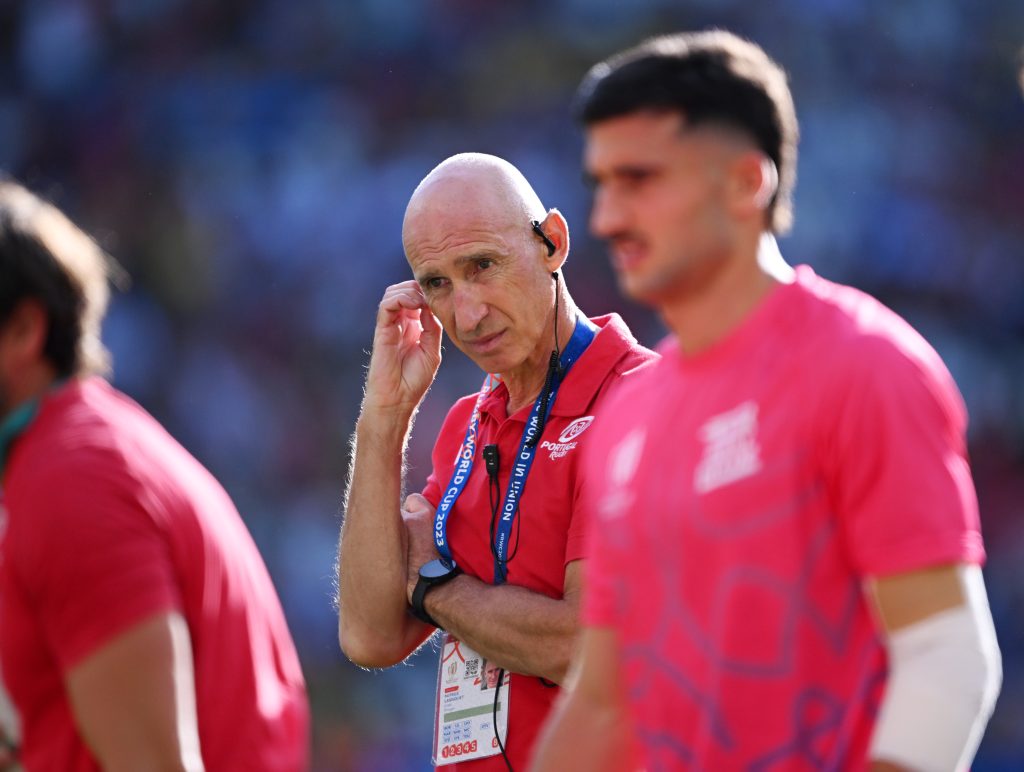Have you felt rugby euphoria? A moment which sweeps your body from the ground and takes it to the stars? For Portuguese fans, and those who fell in love with their national team, euphoria struck when Jerónimo Portela kicked the ball out, drawing a spectacular end to an outstanding match between Portugal and Fiji, clinching a first-ever World Cup win for the Lobos.
As Luke Pearce blew the final whistle, there was a communion of passion and love, a beautiful cocktail of emotions that will live forever in those who played and watched.
Yet a moment which seemed to last a lifetime already feels dated. Supporters have lurched from boundless joy to nerve-jangling anxiety. As Portugal prepare to pit themselves against England A and Ireland’s Club XV, embark on a new Rugby Europe Championship campaign before tackling the mighty Springboks in July, why on earth should they worry?
Well, their team has no head coach, no apparent big-picture plan to harness its World Cup glory, and an avalanche of doubts growing by the week.
Lagisquet’s power vacuum
Patrice Lagisquet departed on a wave of elation in France but his successor in the hotseat, Sébastien Bertrank, lasted only a fortnight before resigning. One coach-less week became two, two became three, and now, almost four months on from the scalping of Fiji, there is still no permanent solution – only a power vacuum surrounding the squad.
Former Pumas supremo Daniel Hourcade has arrived on a consultancy basis, but will be gone in July. He has ex-Uruguay coach Estebán Meneses and former Brazil chief Rodolfo Ambrósio at his side, but uncertainty hangs over the future of the programme.

With almost 30 players featuring across the upper echelons of French rugby, Portugal does not lack capable and competitive talent. But the structure around them will play a key role in creating a brighter tomorrow. Lagisquet understood that when taking charge in 2019, and the tireless four-year project driven by the Frenchman and his staff pushed Portugal to new heights.
Lagisquet oversaw a more professional regime and the players revelled in the environment he created. They acknowledged there could be no success without sacrifice, even if some would fall by the wayside.
That mindset helped players such as captain Tomás Appleton, João Granate, Raffaele Storti and Nuno Sousa Guedes believe they could pull off the impossible: not just compete with the sport’s big dogs, but beat them.
The connection between players and coach was the cornerstone of a searing run of form between late 2022 and the end of the World Cup. A return of nine wins, four losses and one draw was Portugal’s best sequence of results since the early 2000s. They defeated Romania and the USA by record margins along the way.
But Lagisquet’s golden era is over, and with his exit, doubt lingers. Portuguese rugby failed to capitalise on the trailblazers of 2007 who competed at a first World Cup. It took them 16 years and a whole lot of pain to grace that stage again. Many fear history could repeat itself and a massive opportunity slip away.
French connections
Portugal is heavily dependent on its France-based contingent. Close to half of the national squad play in the Top 14 and ProD2, including many of the brightest stars of last year.

The new coaching ticket must have a positive relationship with the French authorities to maximise and manage their resources. Lagisquet, the legendary ‘Bayonne Express’, commanded enormous respect in his homeland, and even short-lived replacement Bertrank was well known there. The last time Portugal overlooked this vital link with the professional game, they were relegated from the REC’s top division.
Recently, they have blended their overseas athletes with amateurs or semi-professionals at home. The pros set the bar for intensity and physicality and challenged the rest to reach it. The creation of the Lusitanos franchise, which competes in the Rugby Europe Super Cup, also helped polish raw talent which stayed in Portugal, providing a better quality of rugby than the domestic league could offer.
Emerging wonderkids such as Storti and Madeira, the gnarled brawn of Francisco Fernandes and iconic hooker Mike Tadjer, the leadership of Appleton and pace-setter Samuel Marques were all tossed together in this melting pot, with Lagisquet chef and both the French clubs and the Lusitanos important seasoning. The meal they cooked up was savoured by millions.
If the Lusitanos project falters, the pro connection is severed or damaged, or the new head coach isn’t respected internationally, Portuguese rugby could again find itself limping through a dark tunnel of problems, grievances and remorse.
Time of the essence
Early in this new World Cup cycle, the union is already behind its European rivals. Georgia, Romania and Spain have secured long-term staff for the next four years. On the emerging nations scene, a few months late can be detrimental, especially if you can’t keep momentum going and the trust of the players intact.

To give you an idea of just how precious time is, Lagisquet started shaping his plan in 2019. Whoever ends up filling his coveted vacancy won’t have that luxury. The World Cup qualification race starts later this year, with the small matter of a match against the back-to-back world champions to consider. All this, while Portugal is reportedly putting together a bid to co-host a World Cup with Spain. Showing a stable blueprint for the future will be a key part of convincing member unions to back them.
The stunning feats of 2023 will endure, but if Portugal not only fail to reach the next World Cup, but to grow rugby in their country, an amazing story will be consigned to the history books.
Portugal’s leaders must learn the lessons of 2007. They cannot afford to make the same mistake.


Rather than drop Italy, its better to add Georgia and Portugal. Then have a relegation system to enter an 8 nations. This would create a bigger audience and potential revenue for such a competition. But thats the key-word providing competition at a standard to compete with Ireland, France and the rest. And how to put that in place. Sadly, revenue and a competitive club system will stall Portugal's development further. But they have lots of potential.
These smaller unions need better revenue streams, drop Italy from having a permanent spot in the 6 nations and have that 6th spot decided by a late year tournament between other European rugby nations, i.e Italy, Georgia, Spain, Portugal and others like Belgium, Netherlands, Germany.
The potential to play in the 6 nations would give it prestige and viewership and Italy will finally be winning some games.
After France were invited into the 5 nations many years ago. It took them over 40 years to win their first championship. Let’s try and put things in perspective more. Italy are only 24 years into the six nations, with far less resources at their disposal than France had. Taking this into consideration, their improving slowly 🐌, another 10, they might win one or at least get close
The problems finding a head coach are only the tip of the iceberg of the problems facing Portuguese rugby (and another symptom of the ingrained amateurism). The Federation is currently liable to pay around €1 million to a national club they illegitimately relegated from the top division (a case they continue to appeal but have lost the last three court cases).
Thanks Francisco Isaac.
It is crucial that the issue of the training team be resolved urgently. We have to take advantage of the balance of recent results. Go Portugal.
I really hope we see a lot of tests between six nations sides and Portugal&Georgia.
Obviously this is unlikely as the world league format will require tests to be played between tier 1 sides, and to always be cross-hemisphere. But it is frankly ridiculous for Fiji and Japan to play the 6N sides more often than Portugal do.